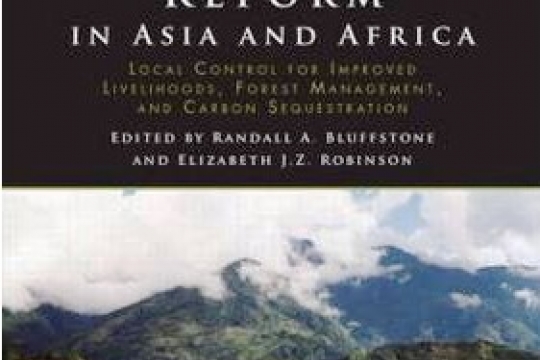Forest tenure reforms are occurring in many developing countries around the world. These reforms typically include devolution of forest lands to local people and communities, which has attracted a great deal of attention and interest. While the nature and level of devolution vary by country, all have potentially important implications for resource allocation, local ecosystem services, livelihoods and climate change.
This book helps students, researchers and professionals to understand the importance and implications of these reforms for local environmental quality, climate change, and the livelihoods of villagers, who are often poor. It is shown that local forest management can often be more successful than top-down management of common pool forest resources. The relationship of local forest tenure reform to the important climate change initiative REDD+ is also considered.The work includes a number of generic chapters and also detailed case studies from China, Ethiopia, Kenya, Nepal, Tanzania and Uganda. Using specific examples and a wide variety of disciplinary perspectives, quantitative and qualitative analytical methods, the book provides an authoritative and critical picture of local forest reforms in light of the key challenges humanity faces today.
Table of Contents
- 1. Introduction: Local Forest Reform - Theory and Experience Randall A. Bluffstone, Elizabeth J. Z. Robinson and Mark Purdon
Part 1: Understanding Local Forest Management
- 2. Understanding Local Forest Tenure Reforms: Section Context and Overview Mark Purdon
- 3. Collective Forest Tenure Reform in China: An Overview Jintao Xu and William F. Hyde
- 4. Forest Tenure Reform in Ethiopia Alemu Mekonnen and Randall A. Bluffstone
- 5. Some Background on Tanzania Forest Policy, Institutions and the Forest Land Tenure System Godius Kahyarara
- 6. Forest Sector Reforms in Tanzania and Uganda Mark Purdon, Razack B. Lokina and Mohamed Bukenya
Part 2: Evaluation of Local Forest Management
- 7. Local Implications of Local Forest Management: Section Context and Overview Priscilla Cooke St. Claire and Mahesh Poudyal
- 8. Impact of Forest Management Decentralization on Rural Livelihoods: Evidence from Ethiopia Dambala Gelo and Tekie Alemu
- 9. Local Forest Management Institutions and Their Role in Conserving Woody Species and Biodiversity: A Case Study in Tigray, Northern Ethiopia Tirhas Mebrahtu and Berhanu Gebremedhin
- 10. Where to Collect? Community Forest Management and Disadvantaged Households in Nepal Priscilla Cooke St. Claire
- 11. Local Community Participation under Reformed Forest Management in Kenya: Lessons and Policy Implications Paul Guthiga, Wilfred Nyangena, Ogada Maurice Juma, and Geophrey Sikei
- 12. Community-Based Leasehold Forestry in Nepal: A Genuine Tenure Reform in Progress? Mahesh Poudyal, Bhim Adhikari, and Jon Lovett Part 3: Extending Local Forest Management to Include REDD+
- 13. Extending Local Forest Management to Include REDD+: Section Context and Overview H. Jo Albers
- 14. REDD+ and Tenure: A Review of the Latest Developments in Research, Implementation and Public Policy Debates Lisa Westholm, Robin Biddulph, Ida Hellmark and Anders Ekbom
- 15. Will REDD+ be Successful in Tanzania? Practical Issues of REDD+ Implementation Elizabeth J. Z. Robinson, H. Jo Albers, Charles Meshack, and Razack B. Lokina
- 16. Can Strategic Environmental and Social Assessment of REDD+ Improve Forest Governance? Daniel Slunge, Anders Ekbom, Fernando Loayza, Paul Guthiga, Wilfred Nyangena
- 17. Conclusion: Directions for Research and Implications for Policy Elizabeth J.Z. Robinson, Randall A. Bluffstone, Jintao Xu and Wilfred Nyangena


